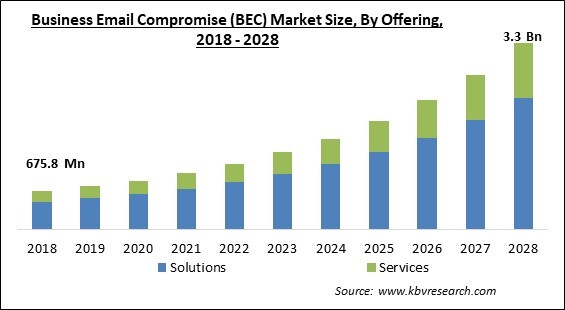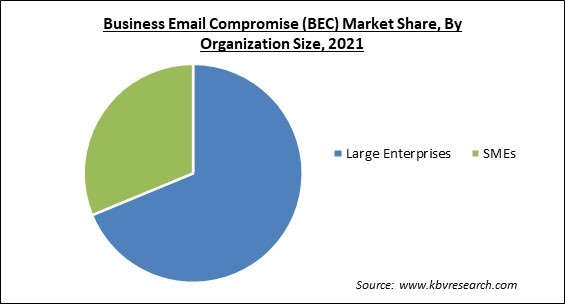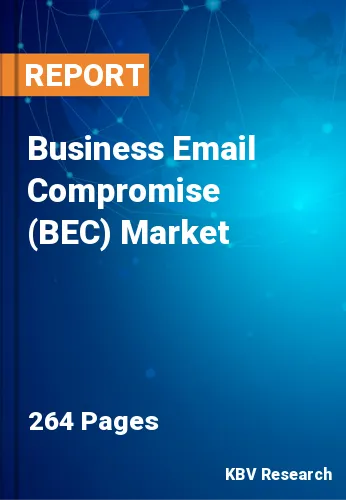The Global Business Email Compromise (BEC) Market size is expected to reach $3.3 billion by 2028, rising at a market growth of 19.0% CAGR during the forecast period.
A sort of scam known as business email compromise (BEC) targets businesses that use wire transfers and have foreign suppliers. Keyloggers or phishing attacks are used to impersonate or hack corporate or publicly accessible email accounts of executives or high-level workers engaged in finance or wire transfer payments in order to conduct fraudulent transfers, costing hundreds of thousands of dollars in damages.

BEC scams frequently start with an attacker taking control of a business executive's email account or any other email that is publicly accessible. This is typically accomplished through the use of keylogger software, phishing techniques, or forged emails that deceive the victim into divulging account information. Phishing attacks use a domain that closely resembles the firm being targeted.
The fraudster would attempt to ascertain who requests wire transfers and who conducts them after observing the hacked email account. The offenders frequently do a good lot of investigation, seeking for a company where the C-suite of the finance section has changed, businesses where executives are on business trips, or by hosting an investor conference call. They take advantage of these as chances to carry out their plan.
Following the pandemic, there has been an increase in BEC and spear-phishing attacks. It is anticipated that rising internet usage, mobile device adoption, and cloud deployment patterns would enhance email platform usage and help expand the adoption of BEC solutions & services. The expansion in the utilization of BEC solutions is also being fueled by the growing regulatory compliances regarding the use of emails. Holistic email protection solutions are in high demand across industries like BFSI, healthcare, IT and ITeS, government, and retail and eCommerce.
The outbreak of the COVID-19 pandemic has impacted various aspects of the business domain. Due to the boosted adoption of the BYOD as well as WFH trends brought on by COVID-19, there have been more spear phishing & BEC attacks on the BFSI infrastructure. Owing to the sensitive & private information they handle, BFSI organizations are subject to strict data security regulations. As a result, there is a growing need for BEC solutions in the BFSI sector.
Phishing attacks, spam emails, virus attacks, identity thefts, APTs, zero-day attacks, and many more sophisticated attacks are increasingly targeting emails. It is extremely vulnerable to target data breaches since every day, more than billions of emails are sent and received. Organizations are being urged by these financial repercussions to implement email encryption solutions in order to effectively secure their email infrastructures. Each company needs to have a strong security posture that guards against ransomware. Effective access management, data encryption, heightened security, anomaly detection, and comprehensive user access controls are necessary for an effective defence against cybercriminals. As a result, it is estimated that throughout the forecast period, increasing phishing assaults will drive the market.
In a BEC scam, attackers assume the identity of a reliable source to coerce their victims into sending false payment information. Gift card theft, payment redirection, and fraudulent supplier invoices are all examples of BEC scams. In order to stop BEC frauds, vendors in the industry use AI/ML capabilities to examine every email message. To prevent any significant financial losses, ML/AI-powered BEC detection tools assist in more efficiently identifying and halting email fraud attacks. Many companies are developing advanced solutions integrated with ML/ AI powered BEC solutions, which would escalate the growth of the market during the forecast period.
BEC solutions assist individuals and businesses in lowering the risk of data loss. There are many different types of open-source email security programmes on the market. Email encryption programmes like VeraCrypt, DiskCryptor, FileVault, and AxCrypt give nearly all of the functionality offered by the leading market manufacturers. The availability of such software on the market negatively impacts big vendors who offer solutions to stop BEC frauds, which has a direct impact on their bottom lines. Therefore, it is anticipated that the accessibility of these free solutions will limit market growth throughout the forecast period.

Based on offering, the business email compromise (BEC) market is bifurcated into Solutions and Services. The services segment recorded a significant revenue share in the business email compromise (BEC) market in 2021. Businesses must provide security awareness training to educate staff how to spot phishing emails or BEC/EAC scams and instill in them a sense of caution when responding to emails that ask for login information or any kind of PII. The emails might look to have been sent by trusted people, and the requests for information frequently seem like they have a good cause.
On the basis of deployment mode, the business email compromise (BEC) market is classified into cloud and on-premises. Cloud segment procured the highest revenue share in the business email compromise (BEC) market in 2021. More businesses are using the cloud as their email option. Attackers and cybercriminals have noticed this pattern and are looking for ways to gain access to cloud-hosted email. For the purpose of remotely defending consumers from phishing emails, companies are proactively implementing cloud-based BEC solutions.
By organization size, the business email compromise (BEC) market is segmented into large enterprise and SMEs. SMEs segment garnered a significant revenue share in the business email compromise (BEC) market in 2021. It is due to the surging demand for various advanced solutions among SMEs in order to gain competitive edge in the market. Companies with a large number of vendors on their payroll and those who outsource work would not be able to tell a genuine invoice from a fraudulent one, making them vulnerable to BEC assaults.
Based on vertical, the business email compromise (BEC) market is categorized into BFSI, Government, IT and ITES, energy & utilities, healthcare, retail & ecommerce, manufacturing and other verticals. BFSI segment recorded the highest revenue share in the business email compromise (BEC) market in 2021. The finance industry is riddled with BEC scams because money is exchanged between firms often and in substantial amounts. The fact that the payouts are frequently substantially bigger than those of conventional email phishing schemes is another factor contributing to their popularity in the BFSI sector. The dangers associated with the customer relationship that are involved indicate a paradigm shift in the way such attacks are being carried out.
| Report Attribute | Details |
|---|---|
| Market size value in 2021 | USD 990.5 Million |
| Market size forecast in 2028 | USD 3.3 Billion |
| Base Year | 2021 |
| Historical Period | 2018 to 2020 |
| Forecast Period | 2022 to 2028 |
| Revenue Growth Rate | CAGR of 19% from 2022 to 2028 |
| Number of Pages | 264 |
| Number of Tables | 460 |
| Report coverage | Market Trends, Revenue Estimation and Forecast, Segmentation Analysis, Regional and Country Breakdown, Companies Strategic Developments, Company Profiling |
| Segments covered | Offering, Deployment Mode, Organization Size, Vertical, Region |
| Country scope | US, Canada, Mexico, Germany, UK, France, Russia, Spain, Italy, China, Japan, India, South Korea, Singapore, Malaysia, Brazil, Argentina, UAE, Saudi Arabia, South Africa, Nigeria |
| Growth Drivers |
|
| Restraints |
|
Region-wise, the business email compromise (BEC) market is analyzed across North America, Europe, Asia Pacific and LAMEA. North America emerged as the leading region in the business email compromise (BEC) market with the maximum revenue share in 2021. Regarding the development and deployment of security technologies, the region is the most advanced. The region's communication infrastructures are generally protected by a number of laws. The National Institute of Standards and Technology (NIST) supports US organizations by offering legislative guidelines to safeguard their vital infrastructure.
Free Valuable Insights: Global Business Email Compromise (BEC) Market size to reach USD 3.3 Billion by 2028
The market research report covers the analysis of key stake holders of the market. Key companies profiled in the report include Check Point Software Technologies Ltd., Broadcom, Inc., Fortinet, Inc., Cisco Systems, Inc., Trend Micro, Inc., Proofpoint, Inc., Mimecast Limited, Barracuda Networks, Inc. (Thoma Bravo), Agari (HelpSystems, LLC) and Zix Corporation.
By Offering
By Deployment Mode
By Organization Size
By Vertical
By Geography
The Business Email Compromise (BEC) Market size is projected to reach USD 3.3 billion by 2028.
Massive Financial Losses Owing to the Bec Crimes are driving the market in coming years, however, Usage of Open Source, Free and Pirated Email Security Software restraints the growth of the market.
Check Point Software Technologies Ltd., Broadcom, Inc., Fortinet, Inc., Cisco Systems, Inc., Trend Micro, Inc., Proofpoint, Inc., Mimecast Limited, Barracuda Networks, Inc. (Thoma Bravo), Agari (HelpSystems, LLC) and Zix Corporation.
The Solutions segment is leading the Global Business Email Compromise (BEC) Market by Offering in 2021, thereby, achieving a market value of $2.3 billion by 2028.
The Large Enterprises is generating high revenue in the Global Business Email Compromise (BEC) Market by Organization Size in 2021, thereby, achieving a market value of $2.1 billion by 2028.
The North America market acquired maximum revenue in the Global Business Email Compromise (BEC) Market by Region in 2021, thereby, achieving a market value of $1.1 billion by 2028.
Our team of dedicated experts can provide you with attractive expansion opportunities for your business.

